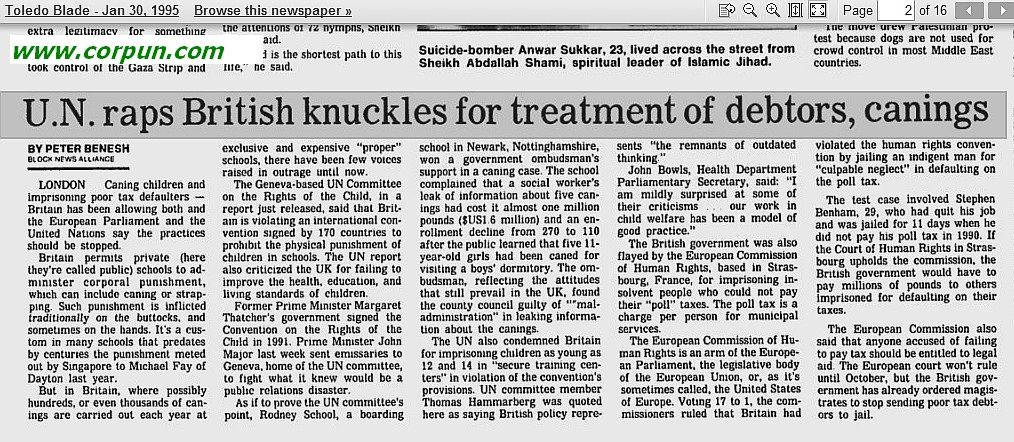|
Corpun file 22102
Toledo Blade, Ohio, USA, 30 January 1995, p.2
U.N. raps British knuckles for treatment of debtors, canings
By Peter Benesh
Block News Alliance
(extract)

Click to enlarge |
LONDON -- Caning children and imprisoning
poor tax defaulters -- Britain has been allowing both and the
European Parliament and the United Nations say the practices
should be stopped.
Britain permits private (here they're called public) schools to
administer corporal punishment, which can include caning or
strapping. Such punishment is inflicted traditionally on the
buttocks, and sometimes on the hands. It's a custom in many
schools that predates by centuries the punishment meted out by
Singapore to Michael Fay of Dayton last year.
But in Britain, where possibly hundreds, or even thousands of
canings are carried out each year at exclusive and expensive
"proper" schools, there have been few voices raised in
outrage until now.
The Geneva-based UN Committee on the Rights of the Child, in a
report just released, said that Britain is violating an
international convention signed by 170 countries to prohibit the
physical punishment of children in schools. [Note by C.F.: Actually the convention says no such thing: it doesn't even mention CP.] The UN report also
criticized the UK for failing to improve the health, education,
and living standards of children.
Former Prime Minister Margaret Thatcher's government signed the
Convention on the Rights of the Child in 1991. Prime Minister
John Major last week sent emissaries to Geneva, home of the UN
committee, to fight what it knew would be a public relations
disaster.
As if to prove the UN committee's point, Rodney School, a
boarding school in Newark, Nottinghamshire, won a government
ombudsman's support in a caning case. The school complained that
a social worker's leak of information about five canings had cost
it almost one million pounds ($US1.6 million) and an enrollment
decline from 270 to 110 after the public learned that five
11year-old girls had been caned for visiting a boys' dormitory.
The ombudsman, reflecting the attitudes that still prevail in the
UK, found the county council guilty of
"maladministration" in leaking information about the
canings.
The UN also condemned Britain for imprisoning children as young
as 12 and 14 in "secure training centers" in violation
of the convention's provisions. UN committee member Thomas
Hammarberg was quoted here as saying British policy represents
"the remnants of outdated thinking."
John Bowls, Health Department Parliamentary Secretary, said:
"I am mildly surprised at some of their criticisms ... our
work in child welfare has been a model of good practice."
The British government was also flayed by the European Commission
of Human Rights, based in Strasbourg, France, for imprisoning
insolvent people who could not pay their "poll" taxes.
The poll tax is a charge per person for municipal services.
[...]
| |
About this website
Search this site
Article: School corporal punishment in Britain
Other external links: UK school CP
Archive 1976 to 1995: United Kingdom
Video clips
Picture index
|

![]()